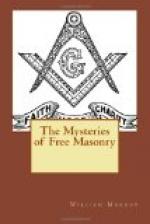This wise philosopher enriched his mind abundantly in a general knowledge of things, and more especially in Geometry or Masonry; on this subject he drew out many problems and theorems; and among the most distinguished, he erected this, which, in the joy of his heart, he called Eureka, in the Grecian language signifying, I have found it; and upon the discovery of which he is said to have sacrificed a hecatomb. It teaches Masons to be general lovers of the arts and sciences. The hour-glass is an emblem of human life. Behold! how swiftly the sands run, and how rapidly our lives are drawing to a close. We cannot, without astonishment behold the little particles which are contained in this machine; how they pass away almost imperceptibly, and yet, to our surprise, in the short space of an hour they are all exhausted.
Thus wastes man to-day; he puts forth the tender leaves of hope; to-morrow, blossoms, and bears his blushing honors thick upon him; the next day comes a frost, which nips the shoot, and when he thinks his greatness is still ripening, he falls, like autumn leaves, to enrich our mother earth. The scythe is an emblem of time, which cuts the brittle thread of life, and launches us into eternity. Behold! what havoc the scythe of time makes among the human race; if, by chance, we should escape the numerous evils incident to childhood and youth, and, with health and vigor, arrive to the years of manhood, yet withal, we must soon be cut down by the all-devouring scythe of time, and be gathered into the land where our fathers had




